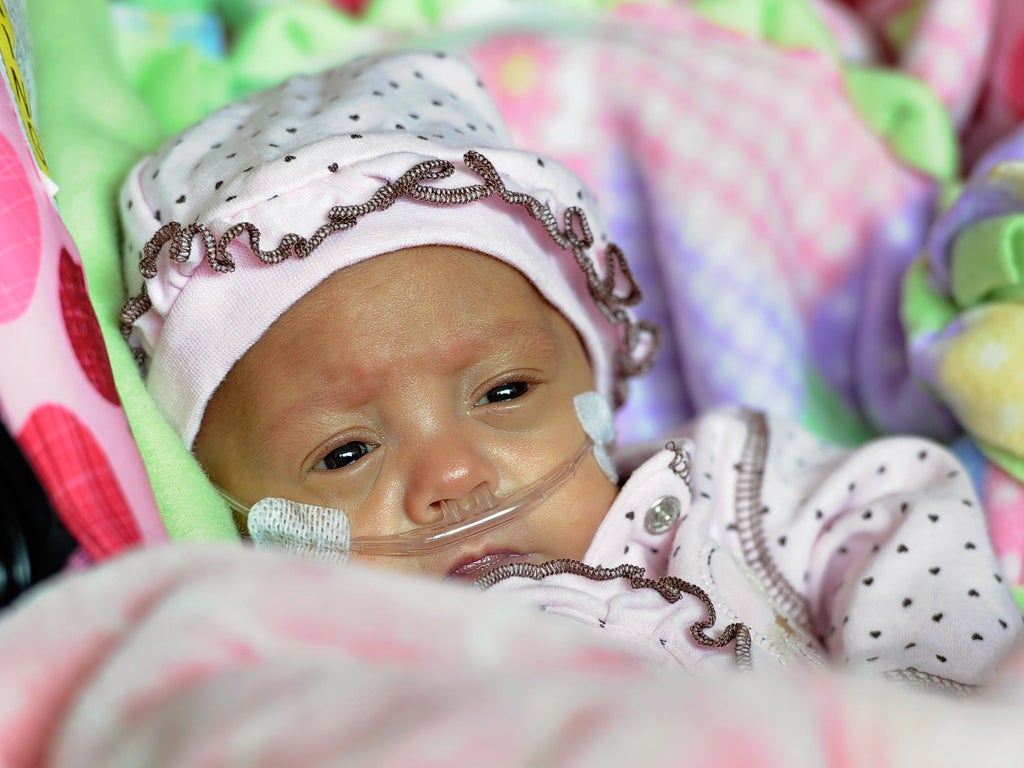Nine-inch baby survives, grows up, and goes home with mum
She weighed less than a couple of mobile phones at birth, but now Melinda's made medical history

A baby weighing a mere 9.5oz (270g) – roughly equivalent to two mobile phones – has finally gone home with her mother after spending nearly five months in an incubator.
Melinda Star Guido was delivered 16 weeks early at the Los Angeles County-USC Medical Center by Caesarean section last summer. At birth, she measured just eight and three-quarter inches long, and was so small she could fit in the palm of her doctor's hand. According to the Global Birth Registry, she is the smallest surviving baby to be born in the United States, and the third-smallest in the world.
Having quadrupled in size since then, now weighing 4.5lbs and breathing through an oxygen tube as a precaution, she has made enough progress to go home. She did so in a blaze of publicity, dressed in a pink knitted hat and wrapped in a pink blanket to face a melee of television cameras, press photographers and her public.
Doctors have said her brain scan was normal and her eyes are developing well. She also passed a hearing test and a car seat test that is required of premature babies before being discharged.
Any infant born before 37 weeks is considered premature, and when a problem with the placenta meant that Melinda arrived just 24 weeks into her mother's pregnancy, it was feared Melinda might not survive, even with advanced medical care.
"I'm just happy that she's doing well", said her mother, 22-year-old Haydee Ibarra. "I'm happy that I'm finally going to take her home. She's a little miracle to me." She may be little, but Melinda packs a strong personality. "She likes to play around a lot and she likes to be goofy. She likes to smile, laugh, she's a really lovable person," Ms Ibarra added.
The baby's father, Yovani Guido, said Ms Ibarra had returned to work as a restaurant cashier in the Granada Hills district of Los Angeles for the months Melinda remained in intensive care, but would now be staying home with their daughter. "She's a fighter. No doubt about that ... I'm looking forward to going out for picnics, spoiling her like any other dad."
Since her birth, Melinda has been treated in the neonatal intensive care unit, where she breathed with the help of a machine and received nutrients through a feeding tube. She was treated for an eye disorder common in premature babies and underwent surgery in November to close an artery. Dr Rangasamy Ramanathan, neonatology chief at the centre, is delighted with her progress, but said that Melinda was fortunate not to suffer more serious complications. "This doesn't happen every day. In my 30 years here ... this is the first time it ever happened that we were able to discharge a baby who weighed less than 400g [at birth]," he said. "We don't expect miracles every day."
It is too early to know how Melinda will fare neurologically and physically, but doctors plan to monitor her regularly for the next six years. After discharge, such extremely premature babies require constant care. Their lungs are often not fully developed and they may need oxygen at home. Infections are common, and even basic activities such as feeding can be challenging. Nevertheless, Dr Ramanathan remains "cautiously optimistic" that the baby will do well, but also emphasising that "there is no guarantee".
The paediatrician Dr Edward Bell, who started and runs the University of Iowa Children's Hospital Tiniest Babies Registry, published a study last year that found many survivors have ongoing health and learning difficulties. Most also remain short and underweight for their age.
There are some rare success stories, however. Rumaisa Rahman, now aged seven, was born at 26 weeks weighing just 9.2oz – the equivalent size of an 18-week-old foetus. He is now a healthy seven-year-old. Another who weighed 9.9oz at birth is now studying psychology at university. Both were born at Loyola University Medical Center in Illinois. About 7,500 babies are born each year in the US weighing less than 1lb and about 10 per cent survive, making Melinda's birth a landmark event. Dr Ramanathan said: "We are hopeful to see many more milestones accomplished in Melinda's development as we follow her care."
Join our commenting forum
Join thought-provoking conversations, follow other Independent readers and see their replies
Comments